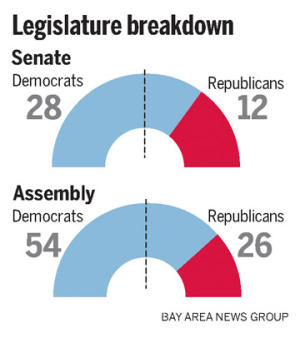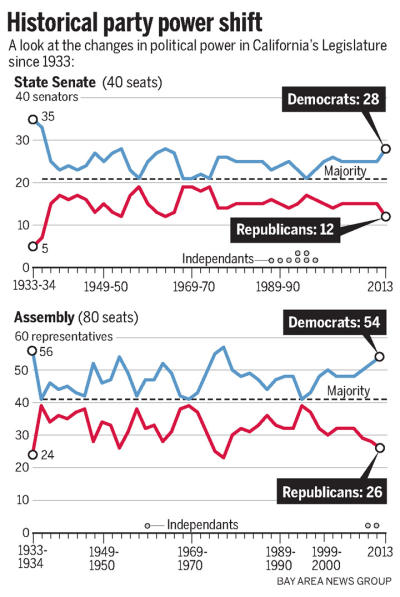Changing Demographics in California Could Signify End of GOP

For the first time in over 100 years, the California Democratic Party captured enough votes to hold a supermajority in each house, solidifying the stronghold Democrats enjoy in the California political process. The deepening blue hues of the state reveal its liberal tendencies and indicate changing demographics in California have led to a significant shift in the political landscape.
California voters not only overwhelmingly voted to re-elect Barack Obama and Dianne Feinstein, but voters passed the controversial tax initiative, Proposition 30, voting to increase taxes on the wealthy in order to fund education. With 28 seats in Senate, the Democratic two-thirds supermajority now has the power to raise taxes without GOP votes, giving Republicans little say in the future of the state.
Credit: http://www.contracostatimes.com/However, Democrats have not always had a monopoly on California politics. First nominated governor of the state in 1966, Ronald Reagan served two terms in the state before running for president. Now heralded as a Conservative icon, Reagan received the support of California voters who were moved by principles of a smaller government highlighted in his "A Time for Choosing" speech.
A surge of immigration drastically changed the demographics of the state, and the once predominantly "white" state transformed into a beacon of diversity. By 1998, the number of Hispanics, African Americans and Asians combined outnumbered the white population, calling for drastic changes in governmental policy. Recognizing the shift in the political landscape, Democrats have responded to the demand for reform, while Republican leaders fail to embrace the issues important to Hispanic voters.
This phenomena is in line with the decline of the GOP on a national scale, arguably caused by an internal split in the party. The Republican Party's main downfall this election was a failure to reach out and communicate effectively with different demographics and their needs.
As argued by Slate, if the presidential election were held 20 years ago, Romney's victory would be ensured, as he received 59% of the white vote. White people who voted for Romney made up 42.5% of the overall vote, making 88% of Romney voters white. While Obama also received a sizable chunk of the white vote, with 56 percent, he dominated in reaching out to minority voters, a skill that Romney failed to grasp. His failure to effectively communicate with these increasingly important voters is arguably what cost him the election, with Obama receiving 93% of the African American vote and 71% of the Latino vote.
Former Republican leader in the California Senate, Jim Brulte explains,
"There are demographic changes in the American electorate that we saw significantly, first, here in California and Republicans nationally are not reacting to them."
In California, crafting a message that resonates with Hispanic voters is the key to success in state elections, as the state is home to the highest number of Hispanics in any state: 14 million.
Credit: http://www.contracostatimes.com/Barely maintaining their place as one of the top two major parties in California, Republicans make up a mere 30% of the total voting population in the state. There were more registered Republicans in 1988, despite the growth in California's population, and independent voters outnumber Republicans in 13 congressional districts in California.
Allan Hoffenblum, a Republican consultant in California for 30 years, said of the Republican Party, "It's no longer a statewide party." He continued,
“They are down to 30 percent, which makes it impossible to win a statewide election. You just can’t get enough crossover voters.” Hoffenblum continued, “They have alienated large swaths of voters…They have become too doctrinaire on the social issues. It’s become a cult.”
If this is any indication of what could happen on a national scale, Republicans should take heed of the shortcomings present in the California GOP. In a state that is nationally recognized and ridiculed for fiscal irresponsibility, the need for Republican leaders to adapt to shifting political landscape is critical.
California acts as reminder that as demographics change, our political landscape shifts as well, creating an unfamiliar frontier for politicians unwilling to adapt. If they are to survive in America as one of the major parties, Republicans nationwide should learn from California. The "traditional" values that the Republican party relies upon may no longer be effective in a not-so-traditional society. As society advances, so should politics.





